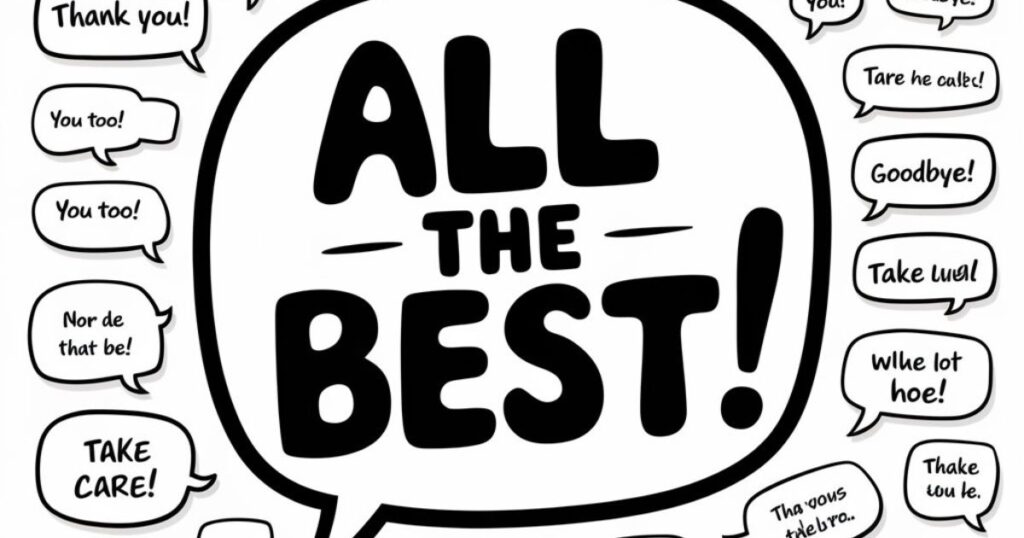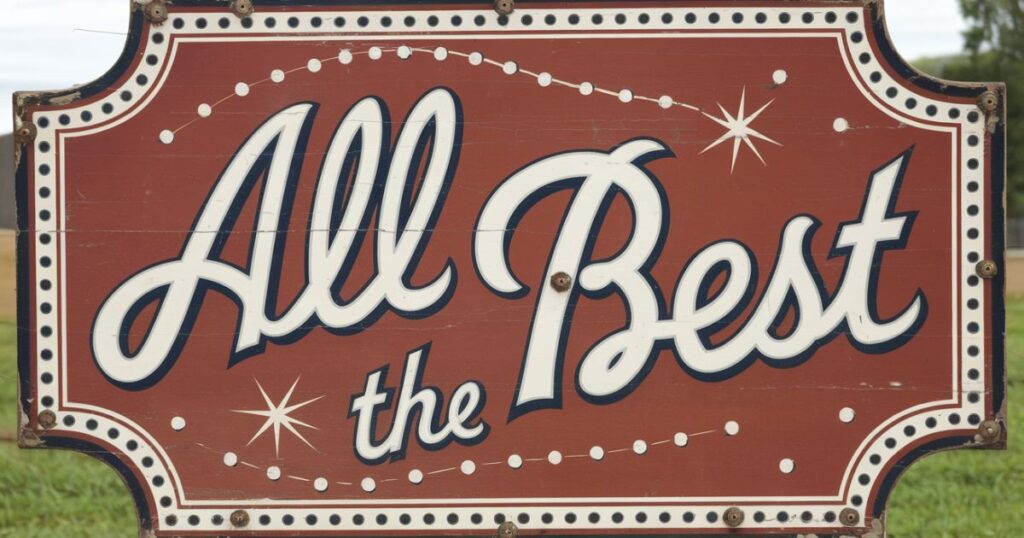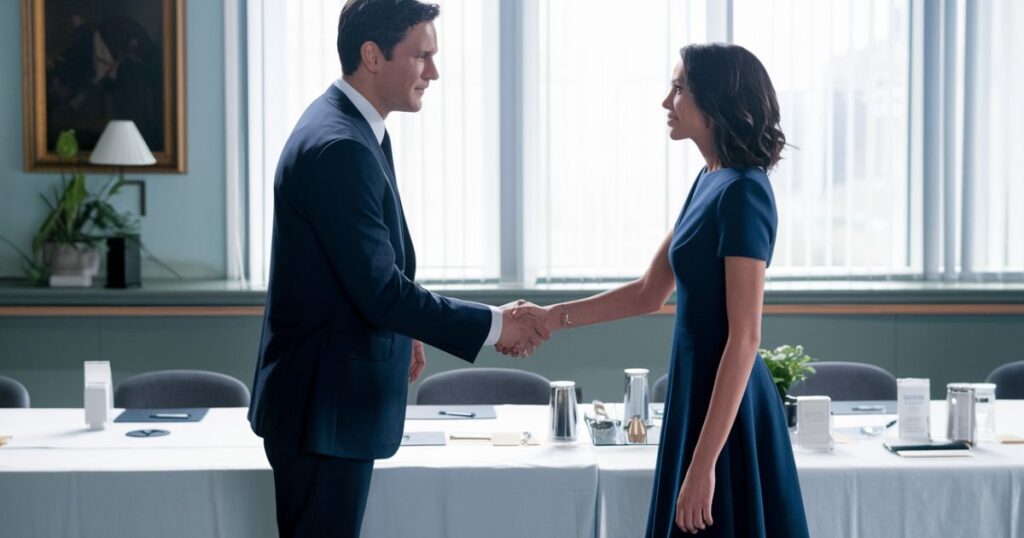Have you ever been wished “All the Best” and felt unsure how to respond? Finding the right replies to “All the Best” doesn’t have to be difficult. It’s all about showing appreciation and warmth in your response. You might wonder, “What’s the best reply for all the best?” The key is to keep it simple, sincere, and genuine. Whether in a casual conversation or a more formal setting, your reply of all the best should reflect kindness.
A simple “Thanks, I really appreciate it!” works perfectly, or you might choose to say “Best of luck reply” to send the same good wishes back.Your replies to “All the Best” doesn’t need to be complicated. It’s really about expressing gratitude in a way that feels right. A quick “Thanks! All the best reply” is enough to show your appreciation. At the end of the day, it’s the thought behind the words that truly matters.
Defining “All The Best”
“All the Best” is a common phrase used to wish someone well in their endeavors. It expresses good intentions and a desire for success, happiness, or good fortune. Whether spoken before an exam, a new job, or any significant event, it’s a way to show support and encouragement.
The phrase is versatile and can be used in both casual and formal settings. It’s a simple yet meaningful way to send positive energy, making it a popular choice in various cultures. By saying “All the Best,” you’re offering someone your heartfelt wishes for success and well-being.
220+ Replies To “All The Best”

Replies to “All the Best” offers a wide range of responses to show appreciation. From casual to formal, there’s a perfect reply for every occasion. These responses help convey gratitude and warmth when someone wishes you well.
Thoughtful Responses
- Thank you for the warm wishes! A kind response strengthens bonds and adds sincerity to conversations.
- I appreciate your thoughtful words. A genuine reply conveys gratitude and deepens mutual respect.
- Thank you for your kind thoughts! A simple response shows gratitude and warmth in return.
- Your words mean a lot! A heartfelt reply makes the interaction more meaningful and personal.
- Thanks so much! A genuine response shows appreciation and creates a positive atmosphere.
- I’m grateful for your kind wishes. A sincere reply strengthens connections and promotes goodwill.
- Thank you! A thoughtful response leaves a lasting impression and builds stronger relationships.
- Your message truly made my day! A warm reply shows respect and builds goodwill.
- I’m thankful for your kind words. A sincere reply conveys appreciation and fosters meaningful connections.
- Thank you for your wonderful wishes! A heartfelt reply shows your gratitude and sincerity.
- Your kindness means so much! A warm response can make the exchange more heartfelt and memorable.
- I appreciate your kindness! A thoughtful reply reflects warmth and encourages positive exchanges.
Engaging Replies
- Thank you for your wishes! An enthusiastic reply keeps the conversation lively and engaging.
- I appreciate your message! A lively reply creates excitement and deepens connections.
- Thanks for the kind words! A fun response helps keep the conversation upbeat and interactive.
- Your wishes are much appreciated! A cheerful reply adds energy and makes the conversation memorable.
- Thanks so much! An engaging response makes the interaction feel genuine and dynamic.
- I’m grateful for your wishes! An energetic reply fosters an open and friendly atmosphere.
- Thank you for reaching out! A lively response keeps the conversation exciting and inviting.
- I appreciate your words! A spirited reply helps build stronger bonds and keeps the dialogue flowing.
- Thanks for your kind thoughts! An engaging reply draws others in and creates an enjoyable exchange.
- Your message is appreciated! A lively response adds spark and energy to the conversation.
- Thanks for the wishes! A fun reply keeps the exchange light and adds excitement to the moment.
- I’m thankful for your message! An engaging response ensures the conversation remains lively and fun.
Constructive Feedback
- Thank you for the feedback! Constructive responses help guide improvement and encourage growth.
- I appreciate your advice! A thoughtful reply shows your openness to learning and self-improvement.
- Thanks for your input! A constructive reply promotes positive change and fosters development.
- I’m grateful for the feedback! A respectful response creates an opportunity for growth and reflection.
- Thank you for sharing your thoughts! Constructive feedback allows me to improve and evolve.
- Your feedback means a lot! A thoughtful response encourages positive change and continued progress.
- Thanks for your insights! A clear and constructive reply helps foster personal growth and development.
- I appreciate your feedback! A respectful response shows your willingness to improve and learn.
- Thank you for your guidance! Constructive replies offer valuable insights for personal and professional growth.
- Your feedback is helpful! A constructive reply encourages self-reflection and continuous improvement.
- Thanks for your input! A thoughtful reply ensures meaningful growth and development from feedback.
- I appreciate your suggestions! Constructive responses help enhance skills and promote positive changes.
Prompt Answers
- Thank you for your wishes! A quick reply shows appreciation and keeps the conversation flowing.
- I appreciate your kind words! A prompt response reflects your enthusiasm and gratitude.
- Thanks for the good wishes! A timely reply keeps the conversation energetic and engaging.
- Your message means a lot! A fast response reflects your genuine appreciation and interest.
- Thanks for reaching out! A prompt reply shows that you value the interaction and the person.
- I’m grateful for your kind message! A swift response builds a connection and keeps it fresh.
- Thank you for the warm wishes! A quick reply helps maintain a positive and lively exchange.
- I appreciate your thoughtful words! A fast response demonstrates respect for the other person’s time.
- Thanks so much! A prompt reply to “All the Best” helps keep the conversation upbeat and connected.
- I’m thankful for your message! A timely response makes the interaction feel sincere and engaged.
- Thanks for the kind thoughts! A swift reply reflects how much you value the good wishes.
- Your message brightened my day! A quick reply shows how much you appreciate the kind gesture.
Clear Communication
- Thanks for the wishes! A clear reply to “All the Best” expresses gratitude without confusion.
- I appreciate your message! A straightforward response ensures your appreciation comes across clearly.
- Thank you for your kind words! A simple, clear reply makes your gratitude easy to understand.
- Your good wishes mean a lot! A clear response reflects your sincerity and appreciation.
- I’m grateful for your message! A direct reply conveys your thanks in the most effective way.
- Thanks for the warm wishes! A clear and simple response ensures the message is received well.
- I appreciate your kindness! A direct reply helps maintain clarity and strengthens the connection.
- Thanks so much for reaching out! A clear response shows that you value the interaction.
- Thank you for your thoughts! A concise and clear reply strengthens your bond and fosters mutual respect.
- Your message brightened my day! A simple reply helps convey your appreciation and adds clarity.
- Thanks for the kind words! A clear response to “All the Best” ensures your appreciation is understood.
- I appreciate your wishes! A direct reply shows that you value their kindness and express gratitude.
Positive Remarks
- Thank you for the lovely wishes! Positive replies make the conversation warm and uplifting.
- I appreciate your kind message! A cheerful response adds positivity and strengthens the connection.
- Thanks for the good wishes! A warm reply reflects your gratitude and spreads good energy.
- Your message truly made my day! A positive reply keeps the mood light and optimistic.
- I’m grateful for your message! A positive reply creates an atmosphere of goodwill and warmth.
- Thanks so much! A positive response shows your enthusiasm and reinforces the good wishes.
- I appreciate your kind thoughts! A joyful reply enhances the exchange and keeps it vibrant.
- Thanks for the thoughtful words! A positive response strengthens the relationship and fosters goodwill.
- I’m thankful for your wishes! A positive reply shows your happiness and appreciation for the gesture.
- Thank you for your kind wishes! A cheerful reply helps maintain a positive and engaging atmosphere.
- Your message means a lot! A positive reply shows gratitude and spreads good vibes.
- Thanks for the warm wishes! A response filled with positivity strengthens your bond and fosters warmth.
Insightful Replies
- Thank you for your wishes! An insightful reply shows deeper understanding and appreciation of the gesture.
- I appreciate your kind thoughts! A meaningful response adds depth and strengthens the connection.
- Thanks so much! Insightful replies reflect genuine gratitude and provide a thoughtful reaction to the message.
- Your message means a lot! A wise response enriches the exchange and fosters mutual respect.
- I’m grateful for your wishes! Insightful replies bring a sense of warmth and deep appreciation.
- Thank you for reaching out! A thoughtful reply highlights the true value of the gesture.
- I appreciate your kindness! An insightful response helps elevate the conversation and create lasting bonds.
- Thanks for your lovely message! An insightful reply shows genuine consideration and reflection.
- I’m thankful for your words! A deep response shows that you truly value the kind wishes shared.
- Your message was truly appreciated! An insightful reply makes the exchange feel meaningful and significant.
- Thanks for your thoughtful wishes! A wise reply shows that you grasp the significance of the message.
- I appreciate your good thoughts! An insightful response strengthens connections by showing deep gratitude.
Helpful Suggestions
- Thank you for your kind wishes! A helpful reply suggests ways to keep the positivity flowing.
- I appreciate your thoughts! Helpful suggestions in your reply encourage growth and further meaningful interactions.
- Thanks for the good wishes! Offering helpful advice in your reply shows genuine care and support.
- I’m grateful for your message! Helpful responses guide the conversation to more positive and constructive outcomes.
- Thank you for your warm words! A helpful reply provides practical insights or suggestions to enhance the exchange.
- Your message brightened my day! A helpful response shows that you value the conversation and suggest next steps.
- Thanks for your thoughtful wishes! A helpful reply can also encourage continued positivity and encourage future interactions.
- I appreciate your message! A helpful response shows that you’re offering more than just good wishes.
- Thank you for reaching out! A helpful reply provides ideas to continue the positive momentum of the conversation.
- Your words were very kind! A helpful response enhances the exchange by offering actionable advice or tips.
- Thanks for the great wishes! A helpful reply directs the conversation toward new opportunities or solutions.
- I appreciate your kindness! A helpful response leads to more thoughtful and beneficial exchanges.
Respectful Replies
- Thank you for your kind message! A respectful reply shows your appreciation for the other person’s gesture.
- I appreciate your wishes! A respectful response acknowledges their good intentions and maintains a positive tone.
- Thanks for the thoughtful words! A respectful reply conveys gratitude while honoring the person’s kindness.
- I’m grateful for your wishes! A respectful reply keeps the conversation courteous and appreciative.
- Thank you for reaching out! A respectful response shows consideration for the person’s time and feelings.
- Your message is appreciated! A respectful reply creates a foundation of mutual respect and understanding.
- Thanks so much for the message! A respectful response shows you acknowledge and value the person’s good wishes.
- I appreciate your kindness! A respectful reply maintains the conversation’s dignity and reflects warmth.
- Thank you for your good wishes! A respectful reply reinforces a positive relationship and fosters goodwill.
- I’m thankful for your message! A respectful reply creates a considerate and supportive exchange.
- Your wishes mean a lot! A respectful reply demonstrates gratitude and adds sincerity to the response.
- Thanks for your lovely message! A respectful reply strengthens bonds and ensures a meaningful connection.
Collaborative Responses
- Thank you for your warm wishes! Collaborative replies invite further discussion and keep the exchange open.
- I appreciate your kindness! A collaborative response encourages continued engagement and strengthens mutual understanding.
- Thanks for your thoughtful message! A collaborative reply shows you’re willing to share and connect.
- Your wishes mean a lot! A collaborative response fosters teamwork and a positive atmosphere.
- Thanks for the good vibes! A collaborative reply helps move the conversation forward in a meaningful way.
- I’m grateful for your thoughts! A collaborative response encourages both sides to contribute, deepening the connection.
- Thank you for the good wishes! A collaborative reply invites further dialogue, keeping the interaction alive.
- I appreciate your message! A collaborative response builds rapport and encourages future positive exchanges.
- Your words are truly appreciated! A collaborative reply strengthens the bond by encouraging mutual exchange.
- Thanks for reaching out! A collaborative response enhances the interaction by adding more thoughtful input.
- I appreciate your good wishes! A collaborative reply nurtures positive conversation and a productive exchange.
- Thank you for your kind message! A collaborative response keeps the conversation flowing with mutual respect.
Appreciative Feedback
- Thank you for your warm wishes! Appreciative feedback shows gratitude and deepens the connection between you both.
- I’m thankful for your kind words! Appreciative replies acknowledge the message and reflect positive feelings.
- Thanks for your thoughtful wishes! Giving appreciative feedback fosters mutual respect and goodwill.
- Your message made my day! Appreciative replies highlight your gratitude, showing the value of the conversation.
- Thanks for reaching out! Appreciative feedback strengthens the relationship and encourages continued kindness.
- I’m grateful for your wishes! Showing appreciation in your reply makes the exchange more meaningful.
- Thank you for your lovely message! Appreciative feedback demonstrates that you value the sender’s kindness.
- I appreciate your good thoughts! Appreciative replies create positive energy and help build stronger bonds.
- Thanks so much for your message! Appreciative feedback reflects your genuine thanks and fosters goodwill.
- Replies to “All the Best”:Your message was truly appreciated! Appreciative replies keep the connection warm and full of gratitude.
- I’m thankful for your words! Appreciative feedback makes the conversation feel more personal and heartfelt.
- Thanks for the lovely wishes! Appreciative replies show that you value the message and the person behind it.
Timely Answers
- Thank you for your good wishes! A timely reply shows that you value the person’s message.
- I appreciate your kind thoughts! A quick response reflects respect for the sender and their gesture.
- Thanks for your wishes! Timely answers keep the conversation flowing and express genuine appreciation.
- Your message was appreciated! A prompt reply shows attentiveness and gratitude in return for the kindness shared.
- Thanks for reaching out! A timely answer creates a more engaging and respectful conversation.
- I’m thankful for your message! Responding quickly shows that you care and are grateful for the message.
- Thank you for your thoughtful wishes! Timely replies keep the interaction fresh and positive.
- I appreciate your kind words! Quick responses reflect respect and help maintain a lively exchange.
- Thanks for your message! Timely answers keep the conversation open and show appreciation for the gesture.
- Your wishes mean a lot! A prompt reply keeps the conversation warm and engaging.
- I’m thankful for your good wishes! A timely answer makes the exchange feel immediate and sincere.
- Thanks so much for your message! Timely responses show attentiveness and reinforce the positive nature of the conversation.
Supportive Comments
- Thank you for your kind wishes! Supportive comments show empathy and deepen the connection between people.
- I appreciate your words! Supportive replies uplift others, making the exchange more heartfelt and positive.
- Replies to “All the Best”:Thanks for your message! Supportive comments create a positive environment, showing care and consideration.
- I’m grateful for your good wishes! Supportive responses show that you’re truly there for the other person.
- Thank you for reaching out! A supportive reply reassures the sender and strengthens the relationship.
- I appreciate your thoughts! Supportive comments add warmth and help nurture positive exchanges.
- Thanks for your kind words! A supportive reply shows understanding and creates a caring atmosphere.
- I’m thankful for your message! Supportive comments reflect the positive spirit and encourage meaningful dialogue.
- Thanks for the thoughtful message! Supportive replies show appreciation and build emotional connections.
- I appreciate your good wishes! Supportive comments create an environment of kindness and mutual respect.
- Your message is truly appreciated! Supportive replies encourage further communication and strengthen emotional bonds.
- Thank you for your lovely words! A supportive reply fosters goodwill and contributes to a positive interaction.
Friendly Responses
- Thank you for your good wishes! Friendly responses show a personal touch, making the conversation more engaging.
- I appreciate your kind words! A friendly reply strengthens the connection and makes the exchange feel warm.
- Thanks for the message! Friendly replies add a lighthearted tone and help keep the conversation enjoyable.
- Replies to “All the Best”:I’m grateful for your wishes! A friendly response builds rapport and keeps the exchange pleasant.
- Thank you for your message! Friendly replies create a welcoming atmosphere and foster positive exchanges.
- I appreciate your good wishes! A friendly reply shows that you enjoy the conversation and care for others.
- Thanks so much for your words! Friendly responses bring joy and encourage further interaction.
- I’m thankful for your message! A friendly reply helps the conversation stay open and inviting.
- Thanks for the thoughtful wishes! Friendly responses promote connection and enhance mutual respect.
- I appreciate your kind thoughts! Friendly replies reflect warmth and make the interaction more meaningful.
- Thank you for reaching out! Friendly responses create a positive atmosphere and keep things lighthearted.
- I’m grateful for your message! A friendly reply is a simple way to build trust and camaraderie.
Concise Replies
- Thank you for your message! Concise replies keep the conversation clear and to the point.
- I appreciate your kind words! A brief reply ensures that the exchange stays focused and effective.
- Replies to “All the Best”:Thanks for your good wishes! Concise responses show respect for the other person’s time and effort.
- I’m grateful for your message! A short, to-the-point reply demonstrates appreciation without over-explaining.
- Thanks so much for reaching out! Concise replies keep the communication smooth and easy to follow.
- I appreciate your thoughtful message! Short replies make the conversation clear and easy to digest.
- Thank you for your kind thoughts! A concise response shows gratitude in a straightforward manner.
- I’m thankful for your wishes! Brief replies keep the interaction efficient and impactful.
- Thanks for the lovely message! Concise replies ensure the exchange is focused and productive.
- I appreciate your message! A short and sweet reply keeps the conversation flowing without any confusion.
- Thanks for your good wishes! Concise responses make the communication easier and avoid unnecessary words.
- I’m grateful for your good wishes! A clear and concise reply helps maintain a focused and meaningful conversation.
Encouraging Feedback
- Replies to “All the Best”:Thank you for your message! Encouraging feedback boosts confidence and motivates the other person.
- I appreciate your good wishes! Positive feedback provides reassurance and helps the relationship grow stronger.
- Thanks so much for your kind words! Encouraging replies create a positive environment and promote further success.
- I’m grateful for your thoughts! Encouraging feedback builds morale and strengthens connections between people.
- Thanks for your message! Encouraging replies inspire and foster a sense of mutual support.
- I appreciate your kindness! Encouraging feedback creates optimism and drives positive outcomes in conversations.
- Thanks for your wishes! Encouraging responses motivate others and show that you believe in their success.
- I’m thankful for your message! Encouraging feedback helps create a culture of support and appreciation.
- Thank you for reaching out! Encouraging replies uplift the sender and contribute to a productive exchange.
- I appreciate your thoughtful message! Positive feedback inspires confidence and promotes goodwill.
- Thanks for your good wishes! Encouraging replies show that you care about the other person’s journey.
- I’m grateful for your kind words! Encouraging feedback boosts morale and keeps the positive vibes flowing.
Meaningful Answers
- Thank you for your good wishes! Meaningful answers provide thoughtful responses that show true appreciation.
- Replies to “All the Best”:I appreciate your kind words! A meaningful reply reflects sincerity and strengthens emotional connections with others.
- Thanks for reaching out! Meaningful answers convey gratitude and create a lasting impact on the conversation.
- I’m grateful for your wishes! A meaningful response enhances the quality of communication and deepens bonds.
- Thank you for your message! Meaningful answers show your genuine appreciation and foster positive exchanges.
- I appreciate your good wishes! Meaningful replies make the conversation more heartfelt and memorable.
- Thanks so much for your thoughts! Meaningful answers express gratitude and leave a lasting impression on others.
- I’m thankful for your message! A meaningful reply adds emotional depth and value to the interaction.
- Thanks for the kind words! Meaningful answers offer sincere appreciation and build stronger connections.
- I appreciate your good wishes! A meaningful reply enhances the tone of the conversation and strengthens ties.
- Thanks for your message! Meaningful answers show that you understand and appreciate the other person’s thoughts.
- Replies to “All the Best”:I’m grateful for your kind words! A meaningful reply reflects your genuine feelings and keeps the exchange positive.
Informative Replies
- Thank you for your good wishes! Informative replies provide valuable insights that contribute to a clearer understanding.
- I appreciate your kind words! Informative replies clarify any doubts and ensure better communication.
- Thanks so much for your message! Informative responses offer helpful information and add depth to the conversation.
- I’m grateful for your thoughts! Informative replies share useful knowledge and make the exchange more valuable.
- Thank you for your message! Informative replies provide additional context and enhance the quality of the conversation.
- I appreciate your good wishes! Informative answers ensure clarity and help to keep the conversation productive.
- Thanks for your message! Informative replies offer relevant details that help guide the discussion.
- I’m thankful for your wishes! Informative replies enhance communication by providing facts or helpful advice.
- Thanks for reaching out! Informative replies share necessary information, keeping the conversation on track.
- I appreciate your thoughtful message! Informative replies support understanding and provide more context for the discussion.
- Thanks for your good wishes! Informative replies ensure that all relevant details are covered clearly.
- Replies to “All the Best”:I’m grateful for your message! Informative replies contribute useful information and create a more engaging exchange.
Productive Responses
- Thank you for your message! Productive responses contribute to the conversation by adding meaningful value.
- I appreciate your good wishes! Productive replies help drive the conversation forward and encourage positive action.
- Thanks so much for your thoughts! Productive responses ensure the conversation stays on topic and results-oriented.
- I’m grateful for your message! Productive replies help clarify the discussion and move things in the right direction.
- Thank you for your good wishes! A productive response makes the conversation more efficient and purposeful.
- I appreciate your message! Productive replies help turn the conversation into a positive, goal-oriented discussion.
- Thanks for reaching out! Productive responses focus on results, helping to move the dialogue forward.
- I’m thankful for your thoughts! A productive reply helps maintain momentum and keeps the exchange meaningful.
- Thanks for the kind words! Productive replies add value to the conversation and encourage further progress.
- I appreciate your message! A productive reply helps turn good wishes into actionable outcomes.
- Thanks so much for your good wishes! Productive responses create a positive atmosphere, leading to constructive dialogue.
- Replies to “All the Best”:I’m grateful for your wishes! A productive reply keeps the conversation on track and encourages future success.
Considerate Replies
- Thank you for your good wishes! Considerate replies show respect for the other person’s thoughts and feelings.
- I appreciate your kind words! A considerate reply acknowledges the sender’s good intentions and adds warmth.
- Thanks so much for your message! Considerate responses reflect your understanding and appreciation of the sender.
- I’m grateful for your thoughts! A considerate reply is thoughtful and acknowledges the kindness of others.
- Thank you for reaching out! Considerate replies make the sender feel valued and understood.
- Replies to “All the Best”: I appreciate your good wishes! A considerate response shows that you care about the other person’s feelings.
- Thanks for your kind words! Considerate replies add emotional value and make the conversation more genuine.
- I’m thankful for your message! A considerate reply ensures the sender feels heard and appreciated.
- Thanks for your message! Considerate replies reflect empathy and make the conversation more engaging.
- I appreciate your wishes! A considerate reply shows gratitude and consideration for the sender’s thoughts.
- Thanks for your message! Considerate replies make the conversation feel more personal and compassionate.
- I’m grateful for your kind words! A considerate response builds rapport and strengthens the relationship.
Read Also: 468+ Suit Captions for Instagram
Cultural Significance of “All The Best”

Replies to “All the Best” carry deep cultural meaning. In many cultures, well-wishes like this are expressions of goodwill and encouragement. The phrase is used to offer positive energy and support for future endeavors.
Global Variations of Well-Wishes
In different cultures, well-wishes vary, but their intent remains the same: to convey kindness and optimism. Some cultures use similar phrases, while others have unique expressions that carry the same meaning. Despite language differences, the sentiment of wishing others the best transcends cultural boundaries.
Symbolic Importance in Rituals
In some traditions, the phrase “All the Best” holds symbolic significance. It’s used during important life events such as weddings, graduations, or career changes. By saying this, people share their hopes for the other person’s success, reinforcing the importance of support in communal ceremonies.
Psychological Impact of Well-Wishes
When someone replies to “All the Best”, it can have a positive psychological effect. Well-wishes boost self-esteem and make people feel valued. The response fosters a sense of belonging and motivates individuals to keep pushing forward.
Enhancing Emotional Resilience
A simple reply to “All the Best” can help strengthen emotional resilience. It serves as a reminder that people care, offering emotional support. This type of encouragement is vital for overcoming obstacles, as it creates a buffer against stress and anxiety.
Building a Positive Mindset
When well-wishes are exchanged, they often have a lasting impact on mindset. The positivity from “All the Best” can inspire individuals to stay hopeful and optimistic. Responding with gratitude deepens this mindset, creating a cycle of encouragement that benefits both parties.
Using “All The Best” in Different Situations

Replies to “All the Best” can be used in various situations, from casual greetings to formal farewells. It is a versatile phrase that adapts to many different settings. Whether it’s used for a job interview or a casual conversation, the sentiment remains the same—good luck and positive energy.
Workplace Use of Well-Wishes
In a professional context, replying to “All the Best” helps create a supportive work environment. Offering such words before a big project or a career change can boost morale. It’s a small gesture that shows solidarity and contributes to a positive workplace culture.
Personal Situations and Friendships
Among friends and family, Replies to “All the Best” carries a deeper personal meaning. It shows care and genuine support for someone’s personal growth. The reply is often more casual, reinforcing close relationships through shared encouragement.
Superstitions and Beliefs Associated with “All The Best”
In some cultures, well-wishing phrases like “All the Best” are linked to superstitions and beliefs. Many people believe that saying these words brings good fortune. These well-wishes are seen as a way to invite luck and positive outcomes into one’s life.
Avoiding Bad Luck with Well-Wishes
In certain traditions, failing to offer well-wishes, or giving them insincerely, is thought to invite bad luck. People believe that not wishing someone the best might negatively affect their future success. As a result, offering sincere well-wishes has become a social custom to maintain harmony.
Superstitions Around Saying “Good Luck”
While “All the Best” is positive, some cultures avoid using the phrase “Good Luck” directly. This belief is rooted in superstition, where it’s thought that tempting fate with such words might bring misfortune. Instead, people may use other expressions like “Have a great time” or “Wishing you success.”
Practical Tips for Giving Well-Wishes

Giving well wishes, especially a reply to “All the Best,” can be a meaningful gesture. It’s important to be sincere in your response to ensure that the person feels supported. Offering specific wishes based on the situation adds a personal touch, making your words more impactful.
Tailoring Responses to the Situation
When replying to “All the Best,” make sure your response fits the situation. For example, for a job interview, you might say, “I’m sure you’ll do great!” or for a personal milestone, you could say, “Wishing you all the happiness in the world.” Tailoring your message shows genuine care.
Responding with Positive Energy
Always respond with positive energy, as it helps boost the morale of the person you’re replying to. Whether it’s a simple “Thank you, all the best to you too!” or a more elaborate message, maintaining a friendly and encouraging tone makes the interaction more uplifting.
FAQ’S
What are good Replies to “All The Best”?
Replies to “All the Best” can be simple and sincere. You can say, “Thank you, I appreciate it!” or “Best of luck to you too!” It’s all about showing gratitude.
How should I reply to “All the Best” in a formal setting?
In formal settings, a polite response like “Thank you, I wish you the best as well” works well. Keeping the tone respectful shows professionalism in your reply to “All the Best.”
Can I reply to “All the Best” with humor?
Yes, replying to “All the Best” with humor can make it more personal and lighthearted. A reply like “Thanks! I’ll try not to mess it up!” can add a touch of fun.
Is there a specific way to reply to “All the Best” in different cultures?
Replies to “All the Best” may vary by culture, but the sentiment remains similar. In many places, it’s common to respond with a simple “Thank you” or “Best of luck reply.”
Why is it important to reply to “All the Best”?
Replies to “All the Best” show appreciation and strengthen relationships. Responding warmly demonstrates gratitude and acknowledges the kind wishes from others.
Conclusion
Replies to “All the Best” is a great way to show appreciation. Whether it’s a simple “Thank you” or a more thoughtful “Best of luck reply,” the key is sincerity. The right reply to all the best depends on the situation, but it should always reflect your gratitude. A reply of all the best can be as casual as “Thanks! Wishing you the same,” or more formal like, “Thank you, I wish you all the best as well.
“When crafting your reply to all the best, keep it genuine. A good reply for all the best can strengthen your relationships. It’s not about the exact words, but the feeling behind them. Whether it’s a quick “all the best reply” or a heartfelt Replies to “All the Best”, make sure it comes from a place of warmth and appreciation.






